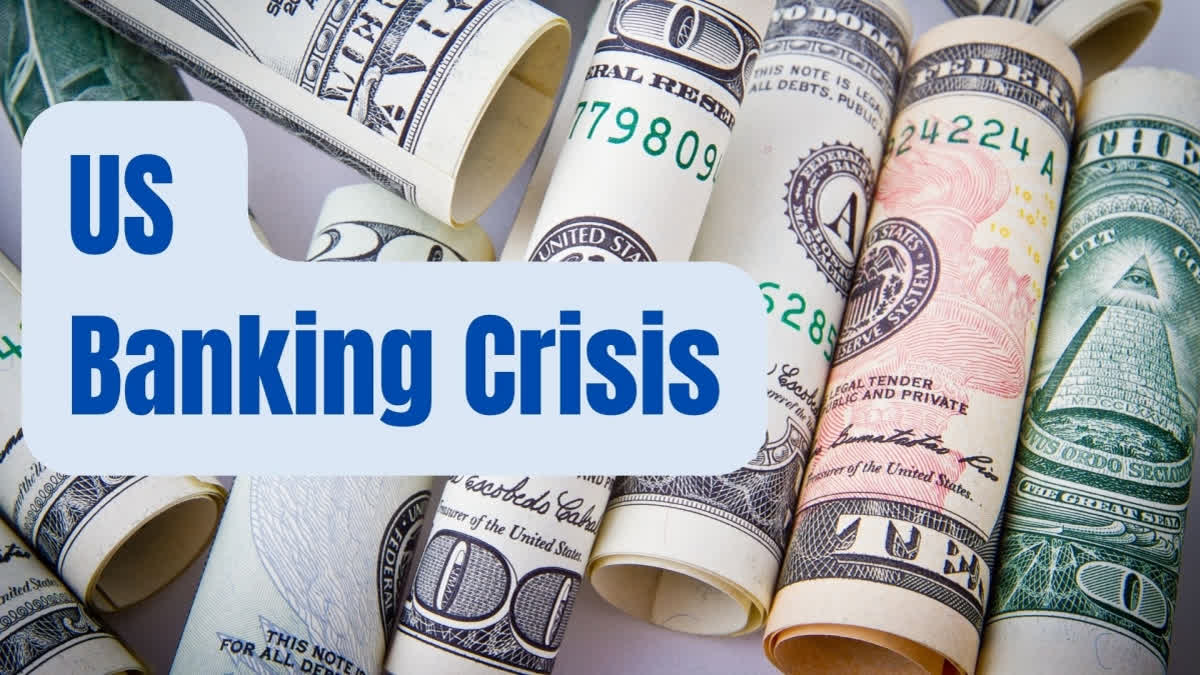New Delhi: With the collapse of Silicon Valley Bank and Signature Bank in the USA within a week early this month which was followed by a hurried merger of the Swiss banking giant Credit Suisse with UBS to save it from failing highlighted the weakness of the banking sector in advanced economies such as the US and Europe. The unfolding banking sector crisis in the USA has shaken the market sentiment in advanced economies, particularly in the USA and G7 countries with wider impact felt worldwide.
Depositors sentiment-According to the US Federal Reserve Data released last week, US depositors withdrew nearly $120 billion from small regional banks after the collapse of Silicon Valley Bank (SVB) on March 10. It showed that the sentiment of depositors in the USA has been shaken in the country’s banking system as authorities and the Biden administration rushed to contain the crisis.
The banking sector crisis has sparked the recessionary fears in the world’s largest economy as the US Federal Reserve has already been tightening the monetary policy over the last year to battle the four decade high consumer inflation in the country that has squeezed the money supply.
Measures proposed-“Concerns are growing that tightening financial conditions will push the US economy into recession and affect other G7 economies as well, according to our sentiment data,” analysts at Oxford Economics wrote in a note.
Analysts at the economic think tank said that since the start of current turmoil in the banking sector, the data showed that the sentiment around the prospects for the economy has deteriorated sharply even though it started from an already low point.
Analysts said the key transmission channels of the banking turmoil into the wider economy are through the impact on lending standards and more generally confidence. To some extent these two factors overlap – tighter credit conditions can destroy confidence as households and businesses worry about refinancing loans and end up pulling back on demand.
Economists are aware that any changes in credit conditions are difficult to observe in a timely fashion. However, this makes sentiment an important coincident indicator of the state of the economy, particularly at important turning points.
India's Past manoeuvre -The crash sentiment in the USA and Europe is not surprising as the news headlines in US media and business publications echoed the sentiments witnessed during the 2008-2009 global economic crises that had prompted the Indian government at that time to cut the basic excise duty by 4 percent in one stroke to shield the country’s economy from the adverse impact of the worldwide economic crises.
Present sentiment-According to the daily sentiment indicators produced by Oxford Economics and Penta, which utilises 400,000 sources in 123 languages, suggest that concerns about a potential recession have risen dramatically in the USA and globally.
“It seems that just as households and firms were becoming more confident that recession could be avoided, the failures of Silicon Valley Bank and other banks has proved a turning point in sentiment, pulling recession concerns back in line with where they were for much of 2022,” analysts at Oxford Economics said in a statement sent to ETV Bharat.
The think tank said that still the concerns are far from being at a level that would suggest a marked change in behaviour by households and firms is likely. “In particular, digging under the surface shows that the fall back in sentiment is concentrated in only a few areas related to the financial sector. Financial risks are clearly elevated, as are concerns about mortgages and solvency,” it said.
Cascading effect- More importantly, while concerns are most heightened in the US, confidence has also taken a beating at global level. The collapse of Credit Suisse and strains at other banks such as Germany’s Deutsche Bank have given rise to concerns in other advanced economies such as European countries, Canada and Japan.
Analysts believe that this highlights the risk that banking sector crisis in the US, even if it is focussed on smaller US banks, can have larger implications for the global economy.
Consumer confidence-There are limited signs so far that the turmoil is feeding into broader consumer confidence measures, which give a good indication of actual spending behaviour. The good news is that, so far, strong labour markets are helping to limit pass-through to broader consumer confidence, which is acting as a circuit breaker on a potentially damaging self-reinforcing cycle. The longer the situation persists, however, the greater the risk that firms will reassess their investment and hiring needs.
US labour market- Analysts at Oxford Economics believe that the ongoing strength of the US labour market, which is key to the overall financial health and confidence of consumers, will help tide the situation as wage growth and employment are solid and are generally expected to remain so.
However, it is too early to relax as developments in the labour market lag the broader economy by a few quarters and if adverse financial concerns persist or intensify then the pass-through to the labour market and the broader support to sentiment may not hold.
In fact, a further controlled deterioration in the labour market is precisely what central banks are aiming to achieve to bring down the core inflation. As the banking sector crisis goes on economists and bankers world over will be closely monitoring the market sentiments as it may reveal any turning point for the economy.
